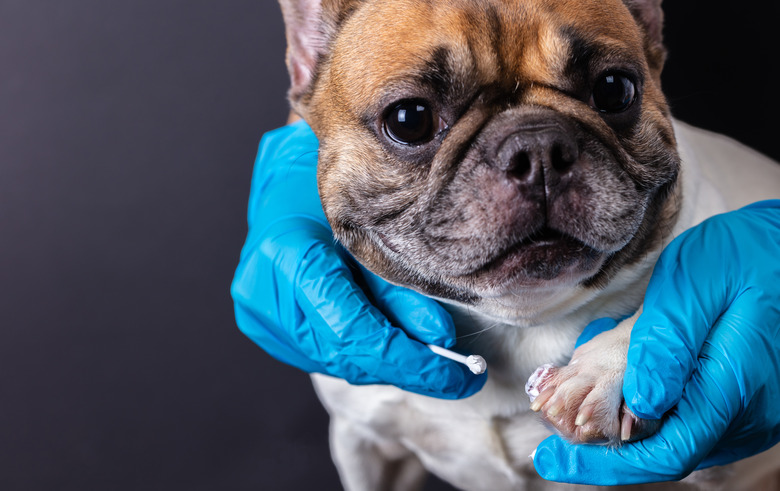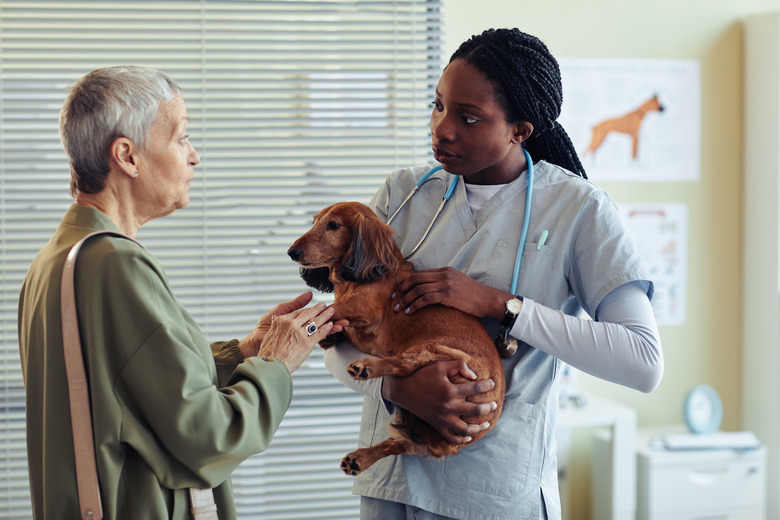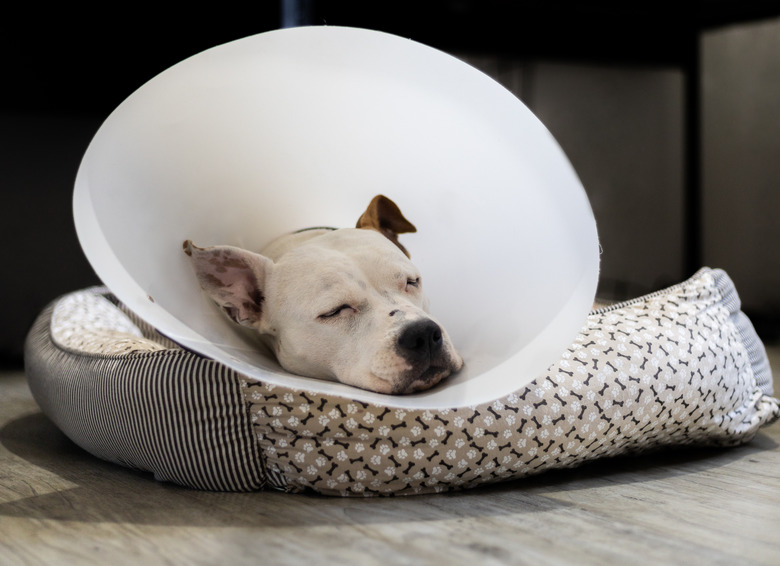Lump On A Dog's Neck Or Throat: Causes & Treatments
If you're a pet owner casually petting your dog and notice a lump on their throat, a lump could suddenly form within your own. While there's always the possibility that the lump could be a tumor, it's also possible that it could be an abscess or wound, or even an insect bite. All dog breeds can develop these worrisome lumps, but some older dogs are more susceptible to thyroid issues, and some breeds, such as golden retrievers or terriers, are more prone to certain types of cancer.
Check the lump as much as your dog will allow and make an appointment with your veterinarian. If there's a cut beneath the lump, wash the area thoroughly and apply antibiotic cream that's suitable for canines.
Canine thyroid tumor
Canine thyroid tumor
Your dog's thyroid glands sit beneath the larynx on either side of the trachea. These butterfly-shaped glands create and release thyroid hormones, which help regulate your dog's metabolism.
A thyroid type of tumor doesn't usually affect hormone production, so the obvious symptoms of a common canine condition, hypothyroidism — too little hormone produced and released — don't typically come into play with thyroid cancer. You might notice that your dog's bark sounds odd since the tumor can press on the larynx, or you could observe coughing or trouble swallowing or breathing. Unfortunately, the overwhelming majority of canine thyroid tumors are malignant.
Thyroid cancer treatment for dogs
Thyroid cancer treatment for dogs
Dog health can be impacted by any kind of cancer treatment. Biopsy of the cyst or affected area is usually vital to diagnosis of a pet health problem. If your dog is confirmed to have thyroid cancer, much depends on whether or not the tumor has metastasized, or spread. A large lump that is cause for concern might lead to blood tests to determine how the cancer is impacting the dog's body.
If the cancer cells have not spread and if the tumor is freely moveable, surgically removing the tumor is the most common treatment, possibly followed by chemotherapy. If the cancer is deeply invasive and surgery cannot be performed, your veterinarian might recommend a veterinary radiation oncologist who can treat your dog daily to weekly with radiation therapy. Side effects of radiation therapy are generally minor and last just a few weeks. Another option is radioiodine therapy, conducted at a special facility with radioiodine directly targeted at the tumor.
Dog throat abscesses
Dog throat abscesses
If the lump appears under your dog's skin as hot and painful to the touch, your dog could have an abscess on their throat. The affected area is swollen, perhaps with hair missing. If your pet recently had a spat with another animal and suffered some sort of puncture wound, even from briars or thorns, an abscess could form around foreign bodies beneath the skin or bacteria.
Keep in mind that a foreign body isn't always needed to form an abscess. The abscess, filled with pus, continues to grow until it ruptures on its own or a veterinarian lances it. Either way, the resulting hole must be disinfected and allowed to drain. Your veterinarian will prescribe antibiotics to fight infection, and your dog might wear an Elizabethan collar until the wound heals.
Where are a dog's lymph nodes?
Where are a dog's lymph nodes?
Swollen lymph nodes can be confused for a lump or lumps on the neck. Dogs with lymphoma, a common type of cancer, often have large mandibular lymph nodes on the left and right sides of the neck. Not all dogs with swollen lymph nodes have lymphoma, but if your veterinarian does suspect lymphoma, they may perform a fine needle aspirate.
Lymphoma is generally treated with chemotherapy, and like all cancers, it is easier to combat if detected early. If you suspect the lump on your dog's neck is a swollen lymph node, report it to your dog's veterinarian.
Dog lipomas
Dog lipomas
A lipoma is lump of fat cells that can form under the dog's skin. Lipomas feel soft and squishy. Canine lipomas can form anywhere in the body, but can commonly be found in the abdomen and chest.
The bottom line
The bottom line
A lump in your dog's throat can be scary, but there can be a variety of common causes for a lump to form, ranging from lymph nodes to thyroid problems to abscesses. As with many noticeable changes in your dog's appearance, it's important to consult with your veterinarian about the best course of treatment.


